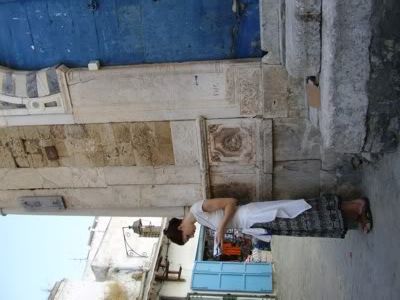 Dusty:Starlight:Culture
|
|
|
|
Jolly Good Show
2006-10-12 9:24 p.m. A television show, Lost, to be specific, has become the thread running from our solar plexuses (plexi?) to those of Claudio and Roberta, the Italians we met in Tunisia. Less dramatically: it's keeping us in touch, connected, communicating and on each other's minds. I love that, and if it has to happen because of dialogue about an annoyingly circuitous and sometimes pretentious television show, so be it. I always get down when communication falls off with someone who is thousands of miles away because that distance, and life, get in the way. (You still alive, Joberg Gavin?) Steve and I watch the show on Wednesday nights, and then Claudio and/or Roberta watch it a day or so later on the internet. We exchange ideas about the show, sure, but in the midst discuss politics, culture, weather, travel, life and complexities of attempting survival in a fledgling democracy that cow tows to some religious right. But I suppose that's everyone's story these days, isn't it? I threw this one at my Italiano friends the other day: I have a class this semester that discusses contemporary political issues pertaining to international women's rights, and I have - no joke - a young woman from Palestine who wears the hijab, and two young women who are American Jews but very connected to Israel for various reasons. As respectful as all attempt to be, our conversations frequently descend into some division - the American girls firing off questions at the Palestinian: "why do women cover their heads in those countries" one said one day, "how can they not see it as oppressive?" While I don't want to assume that this frequent classroom tension is in any way reflective of larger tensions of the two nations, I can't get past the possibility. In the past, I've had students who are supposed to hate each other at whatever period it was appropriate to do so - Indians and Pakistanis, Peruvians and Ecuadorians, etc. - sitting side by side in a classroom, working happily on diagramming sentences, reviewing Focaultian theories on gender, or working out what Faulkner really meant when he said "is" - depending on a class. But in this class, so much tension. In a way, it's the best gift a teacher can ask for - things get so messy and confusing during discussions that I can only assume all involved parties are trying to question their own preconceived notions, even under the guise of hostility toward one another, to work out new ideas or reaffirm/change old ones. But still, I've had to do some really tiring work, pulling and pushing waves of conversation so that they don't drown us all. My Palestinian student can stand up for herself very well and has, in fact - rightfully so - said "Um, I don't know why "Muslim Women" do x or y - I can only speak for myself...". But still, I'm guarded of her; I don't want to allow other students to single her out, especially as she has likely felt singled out enough these days, post-Patriot Act and all that. So I have pulled several members of the class aside, and have given them the "how-would-you-like-it-if-someone-asked-you-to-speak-for-all-white-girls" speech. Additionally, there are the erroneous notions of Muslim women & dress floating about, in that many students are working under the fixed notion that a hijab, chador, or other type of covering that typifies images of women in Islamic countries cannot be considered anything but a tool of oppression and restriction against women. How might it be liberating, I asked the students? How might some women find freedom in such dress, rather than restriction? I watched eyes slide toward the Palestinian that day, but then quickly look away - thankfully, I guess, sparing her from another round of "well? can you speak for "them"?" There's also the fixed notion that we Western women are inherently more "free" or liberated than women in Syria, Jordan, or Iran. How convenient, I always think, that TV has made them think so. We hear so many stories about the disgusting practices of honor killings, female genital mutilation, or courts operating under Sharia law sentencing women to rape as a punishment for some crime her brother committed. But are American women not brutalized, sometimes institutionally? We're really fooling ourselves if we don't think women in American prisons, for example, aren't tortured or are otherwise abused by administrators. And what about that freedom of dress? Are American women not restricted by the narrow roles they must play, symbolized by clothing? Are the women prancing around in thongs in front of Flavor Flav, reduced to objects to be exchanged amongst wealthy, semi-famous men any more free than women covered up in Tehran? What if the woman in Tehran is a University professor? What if the woman on TV has never been sent to a good school, or has suffered so much abuse that she believes herself incapable of anything but objectification? Students say American women have more choice. I'll accept that to an extent, but only if they'll also accept the idea that our choice is mostly an illusion. Makes you all wonky, doesn't it? Well it definitely does me. But my job makes me feel really alive, and I have worked my bum off to get here. What this complicated and emotionally draining situation has resulted in is a ton of work and research for me - so at least it's a type I really enjoy. And hey, I'm getting paid for it. Check out what I found here on the issue that's made me also - uncomfortably - re-examine my own perspectives and biases on the issue. Particularly interesting is the story of a Turkish MP who chose to keep her head covered in their increasingly secular approach to governance (they do, after all, want the EU to like them and stuff) and was practically booed out most meetings she'd attend. Never a dull moment, that's for sure. Weekends are fun, so is escaping in Lost - and the resulting discussions. Waiting to hear from the Italians on the whole model-UN-in-my-classroom bit. Curious for their take - and yours! xoxo
|
||




